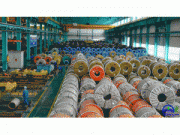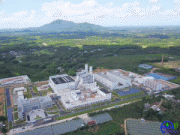免职声明:本网站为公益性网站,部分信息来自网络,如果涉及贵网站的知识产权,请及时反馈,我们承诺第一时间删除!
This website is a public welfare website, part of the information from the Internet, if it involves the intellectual property rights of your website, please timely feedback, we promise to delete the first time.
电话Tel: 19550540085: QQ号: 929496072 or 邮箱Email: Lng@vip.qq.com
摘要:动力煤价格近期下跌数日,已跌破850元/吨。秦皇岛煤炭网3月27日公布的数据显示,3月20—3月26日,环渤海动力煤价格指数报收于722元/吨,环比下行2元/吨。从环渤海六个港口交易价格的采集情况看,5500大卡现货综合价格为848元/吨,长协综合价格为708元/吨。业内人士认..
|
动力煤价格近期下跌数日,已跌破850元/吨。秦皇岛煤炭网3月27日公布的数据显示,3月20—3月26日,环渤海动力煤价格指数报收于722元/吨,环比下行2元/吨。从环渤海六个港口交易价格的采集情况看,5500大卡现货综合价格为848元/吨,长协综合价格为708元/吨。业内人士认为,尽管连跌多日,但在“买涨不买跌”心态下,市场表现依旧较为疲软,后续煤价还将震荡下行,下跌底部或达去年低点的750元/吨左右。
中国电力企业联合会近日发布的数据显示,3月15日—3月21日,纳入统计的燃煤发电企业日均发电量,环比3月8日—3月14日减少6.0%,同比减少8.1%;日均供热量环比减少32.6%,同比增长1.3%;电厂日均耗煤量环比减少8.2%,同比减少8.9%;日均入厂煤量环比减少3.3%,同比减少2.8%;电厂库存可用天数18.1天,环比持平。 中国煤炭市场网董事长冯雨表示,除季节性因素外,还有市场预期等因素影响。近期刚刚进入停暖季,电力耗煤下降程度快于预期,后期淡季时间相对较长,虽然价格已出现明显下跌,但是淡季预期下,市场避险心态浓厚,采购需求改善较慢。 不过,虽然煤价持续下跌,但当前煤企受影响相对较小。“对煤炭企业来说,煤价下跌意味着利润空间将受到压缩,部分煤矿销售压力也会增加,但由于煤炭行业的特性,短时价格波动对生产影响不大,暂时煤炭产量仍会维持高位。但若进一步下行,疆煤外运及高成本区域低卡煤供应或受到影响。”冯雨表示。 “对下游企业来说,一方面,煤价下跌有利于火电企业成本改善,提升盈利能力。另一方面,部分下游企业可能无法完全享受到煤价下降带来的好处。”冯雨进一步解释。 Thermal coal prices have fallen for several days recently, and have fallen below 850 yuan/ton. Data released by Qinhuangdao Coal network on March 27 show that from March 20 to March 26, the Bohai Rim thermal coal price index closed at 722 yuan/ton, down 2 yuan/ton from the previous month. From the collection of trading prices of six ports around the Bohai Sea, the comprehensive spot price of 5500 kcal is 848 yuan/ton, and the comprehensive price of the long association is 708 yuan/ton. Industry insiders believe that although the decline for many days, but in the "buy up do not buy down" mentality, the market performance is still relatively weak, the subsequent coal prices will be shaken down, the bottom of the decline or up to last year's low of 750 yuan/ton. Li Ting, a senior coal industry analyst, said there were seasonal factors to the decline. "The current daily consumption of thermal coal is declining seasonally, the stock of power plants is not low, and the demand is small. Port prices fell, and pit prices also weakened. Except for thermal coal, other coal prices are also falling. According to data released by the China Electricity Council recently, from March 15 to March 21, the average daily power generation of coal-fired power plants included in the statistics decreased by 6.0% from March 8 to March 14, and decreased by 8.1% year-on-year. The average daily heat supply decreased by 32.6% from the previous quarter and increased by 1.3% year-on-year. The daily coal consumption of power plants decreased by 8.2% compared with the previous month and 8.9% compared with the previous year. The average daily coal intake decreased by 3.3% compared with the previous quarter and 2.8% compared with the same period last year. Power plant inventory available days 18.1 days, the same as the previous quarter. Feng Yu, chairman of the China Coal Market Network, said that in addition to seasonal factors, there are also market expectations and other factors. Recently, it has just entered the warm season, the decline in power consumption of coal is faster than expected, the late off-season time is relatively long, although the price has fallen significantly, but the off-season is expected, the market risk-aversion mentality is strong, and the improvement of procurement demand is slow. However, although coal prices continue to fall, the current impact on coal companies is relatively small. "For coal enterprises, the decline in coal prices means that profit margins will be compressed, and the sales pressure of some coal mines will increase, but due to the characteristics of the coal industry, short-term price fluctuations have little impact on production, and temporary coal production will remain high." However, if it goes down further, the export of Xinjiang coal and the supply of low-calorie coal in high-cost areas may be affected." Feng Yu said. "For downstream enterprises, on the one hand, the decline in coal prices is conducive to the cost improvement of thermal power enterprises and the improvement of profitability. On the other hand, some downstream companies may not be able to fully enjoy the benefits of lower coal prices." Feng Yu further explained. |




 资深煤炭行业分析师李廷表示,此轮下跌有季节性因素。“当前电煤日耗季节性下降,电厂库存不低,需求小。港口价格降,坑口价格同样趋弱下降。除动力煤外,其他部分煤种价格也在下跌。”
资深煤炭行业分析师李廷表示,此轮下跌有季节性因素。“当前电煤日耗季节性下降,电厂库存不低,需求小。港口价格降,坑口价格同样趋弱下降。除动力煤外,其他部分煤种价格也在下跌。”












